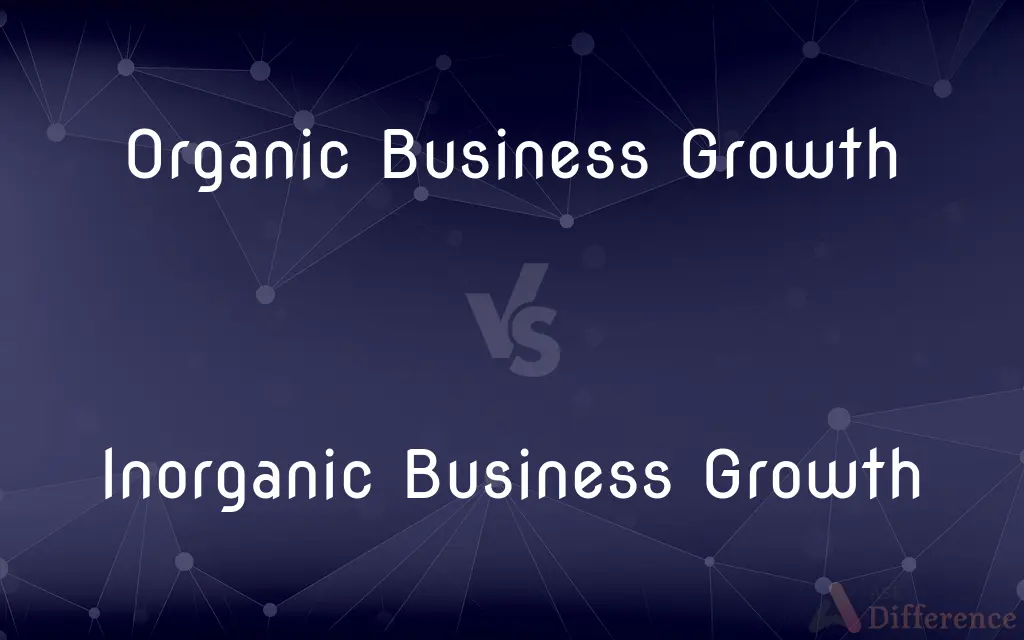Organic Business Growth vs. Inorganic Business Growth — What's the Difference?
By Tayyaba Rehman — Published on October 19, 2023
Organic Business Growth is the expansion through increasing output and enhancing sales internally. Inorganic Business Growth involves expansion through mergers, acquisitions, and partnerships.

Difference Between Organic Business Growth and Inorganic Business Growth
Table of Contents
ADVERTISEMENT
Key Differences
Organic Business Growth and Inorganic Business Growth are two distinctive strategies companies adopt for expansion. Organic Business Growth refers to a company's ability to grow by enhancing its operations, refining its products or services, or expanding its customer base, primarily relying on its resources. It is a gradual and time-consuming process, demanding considerable effort and persistence. On the contrary, Inorganic Business Growth is achieved through external strategies, like mergers, acquisitions, and partnerships, allowing companies to grow swiftly by leveraging the capabilities, customer bases, or markets of other businesses.
Tayyaba Rehman
Oct 19, 2023
In considering Organic Business Growth, companies invest in their current activities. They improve their products, services, and operational efficiency, thereby increasing sales and market share over time. This type of growth is considered stable and sustainable, as it is deeply rooted in the company’s core competencies and developed markets. On the other hand, Inorganic Business Growth implies expanding through strategic collaborations or acquiring other companies. This approach provides immediate access to new markets, technologies, and resources but often involves significant risks and investment.
Tayyaba Rehman
Oct 19, 2023
While both Organic and Inorganic Business Growth aim at enhancing the business value and market presence, the choice between them depends on the company’s vision, resources, risk appetite, and market dynamics. Organic growth might be slow and demanding but offers stability and controlled development. In contrast, inorganic growth can provide quick results and extensive market access but comes with integration challenges and higher risks.
Tayyaba Rehman
Oct 19, 2023
Organic Business Growth primarily involves internal development and innovations. It requires a meticulous understanding of the market, diligent planning, and gradual implementation of strategies to increase customer satisfaction and loyalty. It emphasizes building long-term customer relationships and enhancing brand value through consistent quality and service improvement. Alternatively, Inorganic Business Growth is more strategic and transactional, focusing on acquiring or forming alliances with established entities to achieve rapid expansion and immediate gains, often at the expense of substantial capital and adjustments.
Tayyaba Rehman
Oct 19, 2023
Comparison Chart
ADVERTISEMENT
Definitions
Organic Business Growth
Organic Business Growth requires meticulous planning and market understanding.
With a detailed market analysis, the company formulated strategies for Organic Business Growth.
Tayyaba Rehman
Sep 30, 2023
ADVERTISEMENT
Inorganic Business Growth
Inorganic Business Growth provides immediate access to new markets and technologies.
Through strategic alliances, the company experienced rapid Inorganic Business Growth.
Tayyaba Rehman
Sep 30, 2023
Organic Business Growth
Organic Business Growth involves refining and improving existing products or services.
The continual improvement of their software resulted in steady Organic Business Growth.
Tayyaba Rehman
Sep 30, 2023
Inorganic Business Growth
Inorganic Business Growth is expansion achieved through mergers, acquisitions, or partnerships.
The company quickly scaled its operations through several Inorganic Business Growth strategies.
Tayyaba Rehman
Sep 30, 2023
Organic Business Growth
Organic Business Growth is expansion achieved through enhancing internal operations.
The company’s consistent investment in research led to Organic Business Growth.
Tayyaba Rehman
Sep 30, 2023
Inorganic Business Growth
Inorganic Business Growth involves leveraging external resources and capabilities.
The acquisition of a rival firm accelerated the company’s Inorganic Business Growth.
Tayyaba Rehman
Sep 30, 2023
Organic Business Growth
Organic Business Growth is considered stable and sustainable over time.
By focusing on quality, the brand ensured long-term Organic Business Growth.
Tayyaba Rehman
Sep 30, 2023
Inorganic Business Growth
Inorganic Business Growth demands strategic alignments and integrations.
Integrating the acquired companies posed challenges in the Inorganic Business Growth strategy.
Tayyaba Rehman
Sep 30, 2023
Organic Business Growth
Organic Business Growth relates to enhancing output and customer base internally.
Through excellent customer service, the company experienced substantial Organic Business Growth.
Tayyaba Rehman
Sep 30, 2023
Inorganic Business Growth
Inorganic Business Growth can be capital intensive and riskier.
The company faced significant risks and investments pursuing Inorganic Business Growth.
Tayyaba Rehman
Sep 30, 2023
FAQs
What is Organic Business Growth?
It is growth achieved by a company through internal development, innovations, and enhancing operations.
Tayyaba Rehman
Oct 19, 2023
Can Organic Business Growth be achieved without significant capital investment?
Generally, Organic Business Growth requires less capital investment compared to Inorganic Business Growth.
Tayyaba Rehman
Oct 19, 2023
What is Inorganic Business Growth?
It is growth achieved through external strategies such as mergers, acquisitions, and strategic partnerships.
Tayyaba Rehman
Oct 19, 2023
Is Organic Business Growth a quicker process?
No, Organic Business Growth is generally a slower and more gradual process compared to Inorganic Business Growth.
Tayyaba Rehman
Oct 19, 2023
Can Inorganic Business Growth provide immediate market access?
Yes, Inorganic Business Growth can offer immediate access to new markets through acquisitions and partnerships.
Tayyaba Rehman
Oct 19, 2023
Does Inorganic Business Growth involve higher risks?
Yes, Inorganic Business Growth often involves higher risks due to integration challenges and substantial investments.
Tayyaba Rehman
Oct 19, 2023
Can a company achieve Inorganic Business Growth through internal development?
No, Inorganic Business Growth is typically achieved through external strategies like acquisitions and partnerships.
Tayyaba Rehman
Oct 19, 2023
Is Organic Business Growth more sustainable in the long run?
Typically, Organic Business Growth is considered more stable and sustainable as it is built on internal competencies.
Tayyaba Rehman
Oct 19, 2023
Author Spotlight
Written by
Tayyaba RehmanTayyaba Rehman is a distinguished writer, currently serving as a primary contributor to askdifference.com. As a researcher in semantics and etymology, Tayyaba's passion for the complexity of languages and their distinctions has found a perfect home on the platform. Tayyaba delves into the intricacies of language, distinguishing between commonly confused words and phrases, thereby providing clarity for readers worldwide.

















































